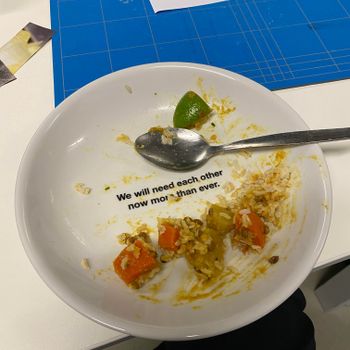During the residency, I will focus on an ongoing project that explores creative work: the infrastructures that surround its practice, the shifting narratives and the challenges faced by art practitioners. I am interested in the production of creativity in the paradigm of a neoliberal society that champions entrepreneurship. Occupational prestige and the desire for greater personal freedom are leading factors in shaping neoliberal thinking in the arts. But the idea that you are free to do whatever you want seems cynical in an economy that has already paved the way for competitive and individualistic careers.
Although the cultural sector is seen as more diverse, progressive and equitable than other sectors, it is often not the case. Fear of economic insecurity, competition and individual shame are inherent in fields where you are judged on what you create. The emotional labour of managing unwanted affects – itself an effective means of control in the context of neoliberalism and socio- economic belonging – is reduced to a personal, attitude problem to be mitigated by more careful emotional regulation. In the creative sector, work is above all something to love, and if necessary, one is prepared to work overtime, make discounts, work for free or put up with a bad working environment in return for that love. Emotional regulation becomes the tacit tool that assures the maintaining and normalizing of poor working conditions.
With my project, I want to initiate a discussion on the working conditions in the arts sector and investigate the system's shortcomings and exploitative tactics. I trust that mutual exchange of knowledge and experience can help to build solidarity to work against an art world based on competition, greed and individualism. How can we support each other and create solidarity through sustainable collective action? What does it mean to be an art worker in today's world and what are the responsibilities that come with it? What is the role and responsibility of art institutions in shaping the working conditions in the sector? How are we complicit in the precarious working conditions of others? How can we turn frustration into a spontaneous creative force that does not remain stuck in the paradigm of cultural entrepreneurship?
Laura Elisabeth Konsand is an art worker and curator based in Estonia and the Netherlands. She is interested in collective, participatory, sustainable and feminist art practices and activism. At the moment, she explores art's connections to the infrastructures that shape our present in visible and invisible ways, seeking to acknowledge, understand and challenge them. She holds a BA in Semiotics and Cultural Theory from the University of Tartu and is currently pursuing a MA in Curatorial Studies at the Estonian Academy of Arts. She has done an internship at the head office of the Manifesta Biennial Foundation in Amsterdam.
Residency is supported by the Estonian Cultural Endowment.
